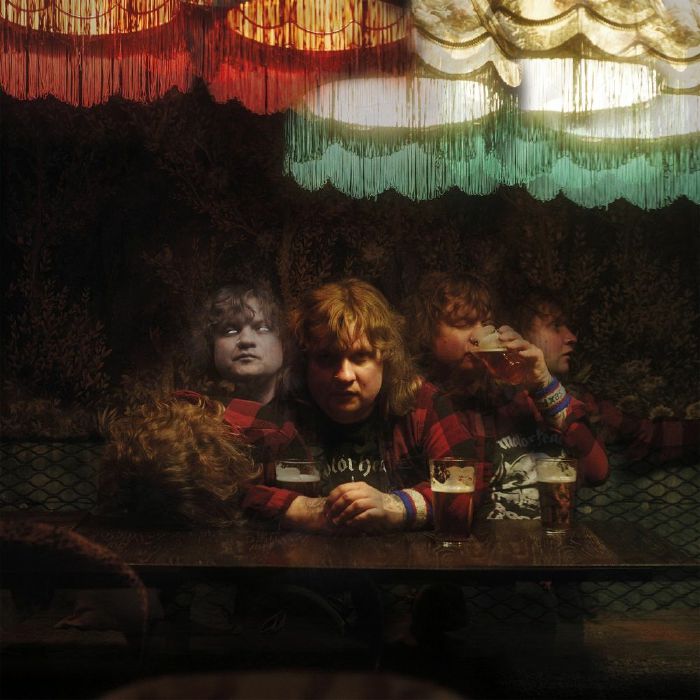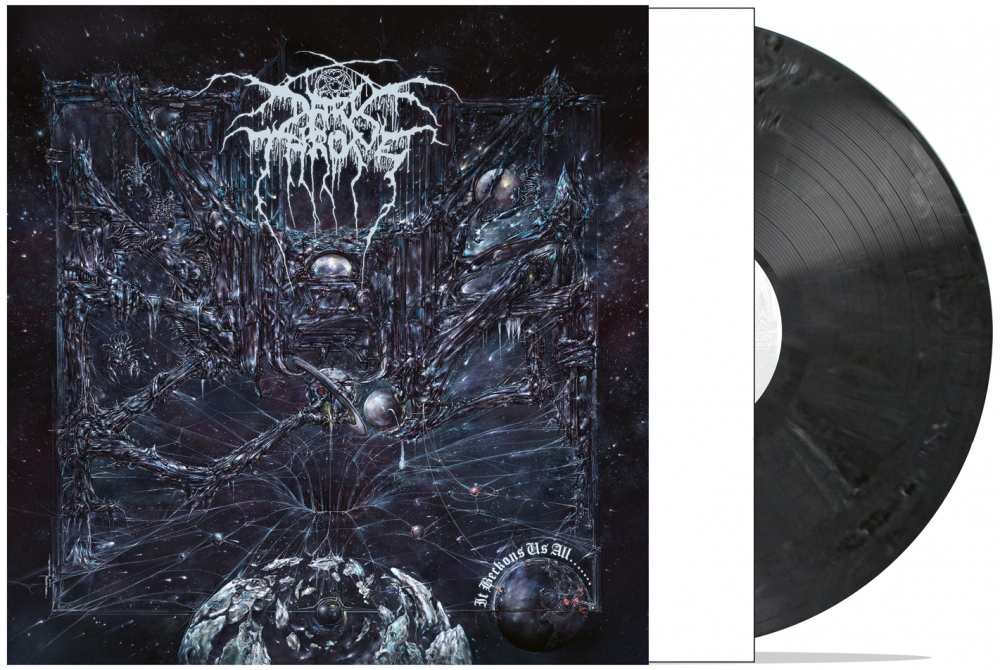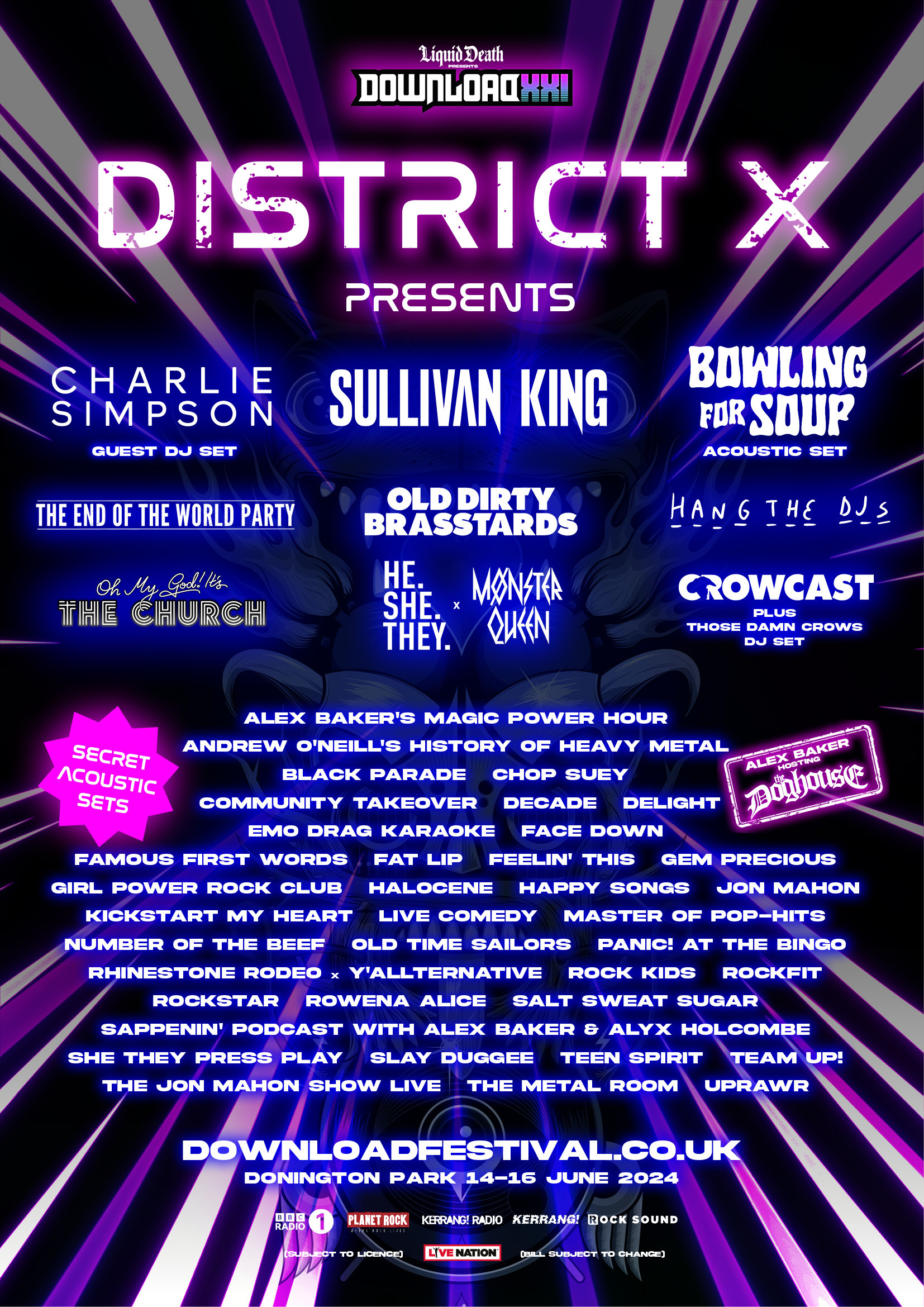We were lucky enough to catch a recent tour package featuring The Damn Truth and, in support, the exceptional Empyre, whose Relentless has been gaining plaudits pretty much everywhere. Catching the band somewhat unawares in the backstage area, we found ourselves interviewing all four members, who kindly put their dinner aside to discuss Relentless, the challenges of recording during lockdown and the transition from playing covers to performing in an increasingly popular (and deservedly so) original band.

The first question is that you grew out of being a covers band. There’s quite a distinction between the world of covers artists and originals artists and, I think, you said previously that you started throwing more original pieces into the set – did you notice a shift in the audience and was there a period of discomfort before you settled into being as you are now?
Did: Yeah, the audience is a lot different to weddings! As a covers band we played weddings and functions – we’re a rock band essentially playing anything from Pearl Jam and Guns ‘n’ Roses to Michael Jackson and other “rock” artists [laughs] and, me and Henrik did that for a long time – loads of different events like beer festivals and things, but I always thought Henrik’s voice really was an originals voice, like we really needed to do our own material. So, we sat down with acoustic guitars… how long before?
Henrik: I think we first started about five years after we started doing the covers band to start trying to do our own stuff. But in terms of crowd reaction, we didn’t… we only used certain gigs where we knew we already had a crowd where we would put our own songs. I don’t think we ever did an Empyre track at a wedding that we’d been [sotto voce] reluctantly booked for.
Did: We wouldn’t have done it as part of a covers set where we had the guys we were using as session musicians.
Henrik: Yeah, and I think a couple of times we might have done a gig – like a short Empyre set and then a covers’ set afterwards. That sort of stuff.
OK – was it a bit of a shock to the system making that transition because it’s a harder sell, the original’s circuit, I think.
Did: Well, we’ve both done originals before – Henrik’s been in an original’s band, I’ve been in numerous original outfits as well, so I’m familiar with the territory. So, covers when we first started doing that, that was… hmmm, well, I’ve done a lot of that as well, actually, so no – it wasn’t much of a transition.
Henrik: I think we knew what we were getting into. We knew the money was not going to be anywhere near as good / not even there. So, yeah, it wasn’t too much of a shock!

So, in terms of developing song structures, from the interviews you’ve done previously, I believe it’s usually individuals going off developing things before you get it in front of the whole band. Is that the case?
Henrik: Quite often and probably more so, that’s how it tends to be. If we take Relentless as an example, I started that off and then Did and I worked on that together, because we had various formats for that song before we actually brought it to the band. Waking Light was something that I had verse-chorus-verse-chorus for, and then brought to the band. Parasite was something that Did developed himself, both lyrically and melodically, and then brought to the band. But there have been tracks that were worked on, like Silent Screaming was one that we worked on predominantly together – but it normally is a case of Did and I coming up with something, or one of us will come up with something, we’ll get a general verse-chorus-verse-chorus / guitar part and vocal down, then invite Elliot and Grant to do what they feel is appropriate and send over a version that has whatever it is that’s lacking in their part, and then we play to that.
OK – so you don’t lay down guide parts on the demo and send it forward? It’s more the structure…
Grant: I think it’s a bit of a mix, so there are tracks that Henrik and Did have written, which have quite a lot of scope, which you can add to and develop a bass part or a drum track. There are other tracks where the song’s pretty much fully formed, and actually this bass part is important to play how it was written – so you respect the songwriter and play it how it’s written. Other times, there’s a bit of scope, so it really depends on the track.
Talking about scope, one of the coolest things that I’ve seen is that you did a cinema playback of the album, involving a 5.1 mix, which is hugely ambitious and, I think, incredibly complicated as well?
Henrik: Um, it wasn’t too bad, because it was a rudimentary 5.1 mix. So, basically we’ve got a nice place in Northampton called Northampton Film House, and they’re also very hospitable, so I went down there about four times before we did the day to see what they could do. And they said, well we can do a 5.1 mix, but they needed optical cables and a certain format. So, we worked out everything they needed and then worked out how I could do a very basic mix. So, it was actually taking the track and putting it into Adobe Premiere and then using that to make a 5.1 mix, just sort of changing various things. So, it wasn’t taking the whole track and taking individual stems and moving them to certain speakers, it was taking the whole track and doing some slight alterations to a stereo mix to make it into a 5.1. But then we also had to do some stuff for the screen, so it still took a little while. A little technical…
Are you fans of surround sound? Because you’re on Kscope, and a lot of bands on that label do opt for surround sound mixes – being a prog-focused label, they have that expertise.
Henrik: yeah, but we didn’t go the full Steven Wilson and have the full Atmos experience… I looked at Atmos and went “nah, that’s not happening!” But I wouldn’t rule it out at some point. I’d like to do an Atmos mix at some point, but that’s ambitious and I’d need to get an Atmos set up to do those sorts of things, then get all the stems and do it that way. But yeah… We’ll keep it simpler for the moment.
How did you come to hook up with Kscope in the first place? I think your manager has connections with Peaceville, is that right?
Henrik: Yeah, so he was working with a band on Peaceville, a sort of sister label under the Snapper Music brand, so they’ve got three labels under there and, because of those connections… we’d just done Relentless, we’d recorded it all ourselves, we’d paid for it all ourselves and we were preparing to release it ourselves as well, and he said “look, can we just send it over to Kscope and see what they think.”
We knew that we’re not as proggy as some of those bands on the label are, but they came back and said they loved it, so we got into a negotiation process and we just thought we’d rather work with a company like Kscope and be in the family of all those great artists, than try to do it all ourselves.
In terms of the music, atmospherically it fits very well within the Kscope family, and lyrically it deals with emotions that don’t fit into the radio rock arena – when you’re developing the sounds and having the opportunity to record for yourself, how do you approach the atmosphere of the recording?
Did: We didn’t have too much restriction in terms of the sounds and effects we wanted. We didn’t put too many limitations on what we wanted to do, and the music sometimes lends itself to certain ways of recording. So, for example with Grant, when we’re in the studio, we brought out the fretless bass, and that’s just like an incredible sound that suits certain songs but isn’t applicable to other songs. And the same thing applies to me as a guitarist and Henrik with his use of effects – it’s serving the song. They’re complementing the song and staying out the lead vocal.

And, what about the flow of the album in terms of sequencing?
Henrik: When I was listening to it, I just put it in different orders in the car, for the most part and then suggested we have it in that way. I don’t know why, but Your Whole Life Slows, which is a track all built around Grant’s bass riff – that just seemed like a closing song to me.
Grant: Yeah, I get the message [laughs] no one’s going to listen to it all the way through…
At least you weren’t bonus tracked – “yeah, it’s a great song – B side!”
Henrik: Next album!
Grant: Don’t give him ideas! Twenty minutes of white noise, get the bass player’s track.
Henrik: That was your idea, I was just thinking it would be kind of cool!
And live in interview, the band break up…
Henrik: But, I think, Self-Aware, that was harder for us to decide than Relentless. Relentless… I knew I wanted it to start with the title track.
Elliot: With Self-Aware, there was lots of to-ing and fro-ing. We all had a kind of idea about what we wanted and there were several different listings, and it took a long time to get to where we wanted. With Relentless, it just seemed to be a bit more… it just kind of happened. Probably because Henrik decided what should go where, which made the process a lot easier.
Henrik: Anyone unhappy with it [the band generally demur] I thought I’d ask them one day, today seemed like a good day!

In terms of developing the lyrics because they are very open – do you discuss as a band what the motivation is behind them?
Henrik? I don’t think we do, do we?
Did: the times of discussion when we do it is to modify certain musical ideas so they fit the way Henrik’s going to sing it, or changing vocal melody inflections, or if it’s a poor choice of word – is there a different way we can say this… synonym!
Henrik: we use Google search with the synonym feature a lot.
Did: But no, the subject matters, they can be personal, but they can be about larger topics and I think the beauty in some of it, though, and why people get the lyrics tattooed on themselves is because it’s relatable and people can identify with that in their own lives, so when we’re playing certain songs and, we’re at a stage now, where we see people singing the lyrics back…
Henrik: It’s taken a while!
Did: Yeah… like one person out of a hundred, and we paid that person too… but I think it’s all sorts really in that they are personal, but they’re relatable. And sometimes not even thought out that much.
Last question, really: in terms of getting the album together, I think you did a lot of it during the pandemic, so were you trying to find spaces and times during the lockdown to get together, or did you have to do it all remotely?
Elliot: A lot of it was remotely. A lot of it was. We’d just record our own stuff at home, send it over and put the bits together and say yes or no. It’s what we had to do, we didn’t have a lot of options, as with everybody else in that set of circumstances.
Grant: When things relaxed, we got into the rehearsal rooms to work things through, but the bulk of it was done remotely. We had to get our own set ups and share demos and write our parts, get them across, get feedback. When we finally went to the rehearsal room, it was kind of a relief to get together and hear how the songs had developed.
Did it push you into different ways of doing things, not having to contend with the space of the rehearsal room?
Henrik: I think it gave freedom in the sense of what Did and I would put together, and especially with Grant and Elliot, as Grant said earlier, you might decide you had to keep a certain bit, but otherwise there was freedom – especially in terms of producing different versions of something and thinking whether we liked version 1, or version 2… When Did sent me the melody to Parasites, he sent me a general melody, and I did various versions of singing it up and down and in different styles to see what worked best for the song. So, we worked all that out in demo form so, when we got to the rehearsal room, I knew how I’d be singing that song – it was already done. I think the same thing happened with Elliot and various drum parts we’d send over and
Elliot: yeah, Parasites, I just thought I’d have a bit of fun. So, I did it and they all loved it and then it went on the track, and now I have to play it all the time!
Grant: those sorts of unexpected creative moments, so I sent a demo over of a bass riff that then became Your Whole Life Slows and I played it in my house. I have a very noisy house, I have young kids making a racket in the background, there’s a washing machine on spin cycle going absolutely nuts and I’m playing this part and I’m really proud of it and I go “Ok guys, what do you think” and Henrik was like “what’s that in the background?” And he was more interested in my washing machine than he was in the bass part. But that became a big part of the actual recording, so if you listen to the last track on the album…
Henrik: Oh, it’s that one.
Grant: There’s kind of a drone sound, and that’s inspired by my washing machine… which has a writing credit on the album.
Amazing, thank you guys very much.










Leave a Reply